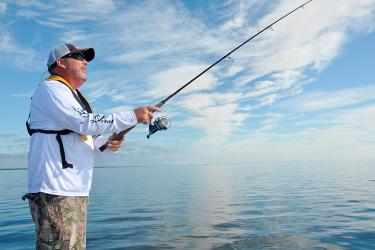Kimberly Hyde is based out of our Narragansett (RI) Lab and is an oceanographer in the Center's Ecosystems Dynamics and Assessment Branch. She uses phytoplankton data collected from satellites in space to study how ocean phytoplankton productivity and species composition affect fisheries and ecosystem productivity.
1. What got you interested in science?

I have always been curious about how things work and grow, and that curiosity was encouraged by my father who taught me to ride a horse, fish, helped me with my science fair projects, took me on his veterinarian farm calls, and gave me a true appreciation for Mother Nature. However, I think my first true interest in science was sparked by my fifth grade science teacher. She taught us astronomy, showed us how to do experiments, encouraged us to participate in the science fair and was our advisor in the Junior Astronauts program. Ever since that year, my science classes were always my favorite.
2. When did you know you were going to be a scientist?

When asked as a little kid in early elementary school, "What do you want to be when you grow up," I recall saying I wanted to be a scientist. At the time, I didn't really know what it meant to be a scientist, except that they wore white lab coats. Later in high school and college, I always enjoyed my science courses, especially the field biology classes where I learned a completely different aspect of science outside of the laboratory. I didn’t know in college exactly what type of job or career I wanted, but it was the field biology courses that made me want to learn more about the oceans and go to graduate school.
3. What accomplishment is your proudest so far?

It is important to me that the research I do studying phytoplankton has real world applications. Phytoplankton are the base of the marine food web and are responsible for half of the photosynthetic activity on the planet, thus a crucial component of the marine ecosystem. While most of my work studying phytoplankton is a less visible aspect of fisheries management, I am proud of our modeling efforts showing how the productivity and species composition of phytoplankton affects fisheries production and the total productivity of ecosystems. I am also extremely proud of being a mother, and while juggling work and home life isn’t always easy, showing my daughter that she can be anyone she wants to be is my most important job.
4. What advice would you give young women about a career in science?
I think it is important for any aspiring scientist to find a good mentor. It’s because of the wonderful mentors I had in undergraduate and graduate school that I have the career I have today. Also, don’t limit yourself to a specific field too early. During college, I entertained several potential career options, but I never thought I would become an oceanographer at NOAA studying microscopic phytoplankton in the ocean using satellites. There are so many fascinating scientific fields of study. You should take full advantage of any opportunities or experiences offered to you to learn about different fields of science and types of jobs before choosing a career path.
To learn more please contact Heather Soulen.


